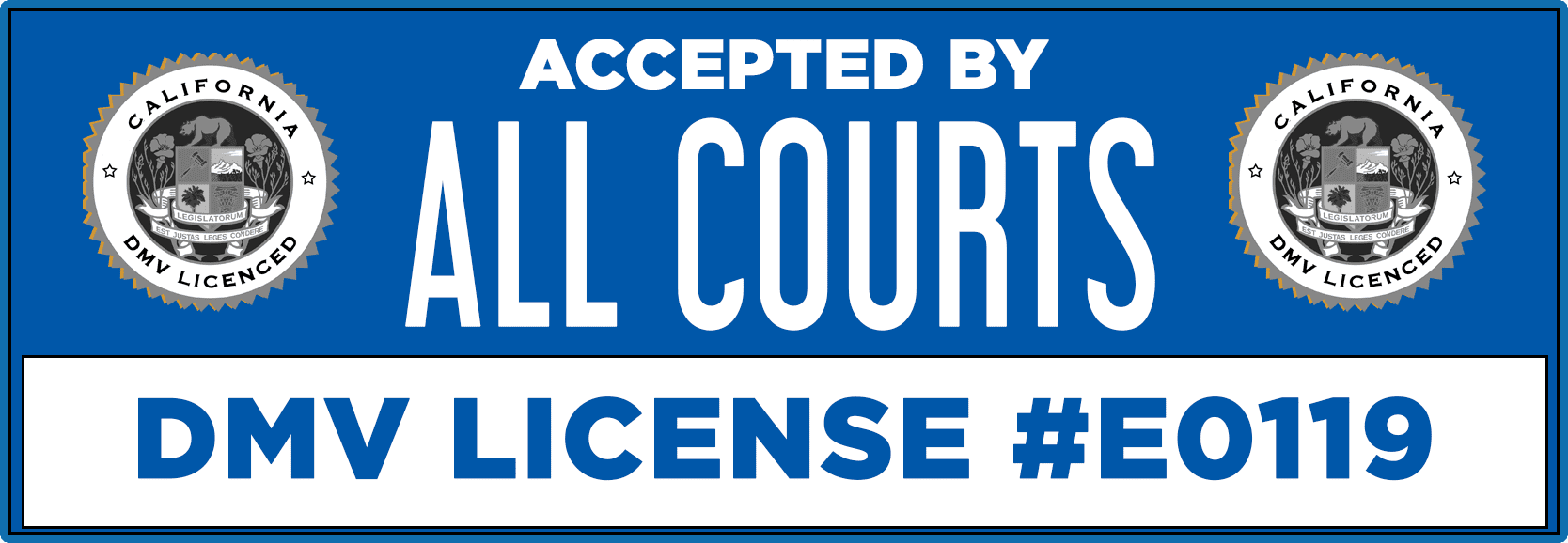
Traffic violations can damage your driving record. The DMV has a point system to gauge the quality of your driving; and the more points you accumulate, the more negligent you are considered to be. Both the DMV and your insurance company use the point system to determine penalties.
What exactly is the point system and how does it work
The DMV point system is a method used to track and penalize drivers for traffic violations. Points are added to a driver’s record for infractions such as speeding, running red lights, and DUI offenses. Accumulating too many points within a specific timeframe can lead to consequences such as increased insurance rates, fines, and the suspension or revocation of the driver’s license. The exact details of the point system, including the number of points assigned for each violation and the thresholds for penalties, can vary by state.
One Points are assigned for the following
- Most traffic violations and minor collisions will count ONE point against a driver’s license.
- Speeding 1-15 mph over the limit.
- Making an unsafe lane change.
- Running a red light.
- Failing to stop at a stop sign.
- Following another vehicle too closely (tailgating).
- Not signaling when turning or changing lanes.
- Failing to yield the right of way.
- Driving without headlights when required.
- Not wearing a seatbelt.
TWO points are assigned for the following (though some of these can qualify for 3)
- Driving at an unsafe speed.Making an illegal U-turn.
- Running a red light resulting in an accident.
- Failure to stop for a school bus with flashing lights.
- Causing an accident that results in injury.
- Driving with an open container of alcohol.
- Ignoring or evading a police officer’s signal.
- Driving on the wrong side of the road.
- Improper passing on a hill or curve.
Three Points are assigned for the following
- Reckless driving.
- Speeding 25 mph or more over the limit.
- Fleeing the scene of an accident (hit and run).
- Driving under the influence of alcohol or drugs (DUI).
- Street racing or engaging in a speed contest.
- Driving with a suspended or revoked license.
- Operating a vehicle with willful disregard for safety.
- Vehicular manslaughter (non-felony).
- Passing a stopped school bus.
The DMV considers drivers negligent operators of a motor vehicle and subject to license suspension or revocation if they accumulate:
- 4 points in a 12-month period
- 6 or more points in a 24-month period
- 8 or more points in a 36-month period
What Happens if you get more than 4 points in a 12-month period?
If you accumulate more than 4 points in a 12-month period, you may face serious consequences. Typically, this can result in a warning letter from the DMV and may escalate to a suspension or revocation of your driver’s license. In addition, you may be required to attend a mandatory defensive driving course or traffic school. Insurance rates are likely to increase, and you may incur additional fines or penalties. The exact repercussions can vary depending on state laws and the severity of the infractions.
LICENSE PENALTIES FOR NEGLIGENT DRIVING
The Department of Motor Vehicles developed a traffic control system called, the Negligent Operator Treatment System (NOTS). Since 1915, when California first began to issue driver’s licenses, the DMV has had some responsibility for highway safety through its licensing authority. Through the years, this obligation has been re-emphasized many times in legislative actions. The enforcement procedures given to the DMV include suspension, revocation, and cancellation of a driver’s license.
The Negligent Operator Treatment System (NOTS) is based on negligent operator points and consists of a computer generated series of warning letters and progressive sanctions against the driving privilege.
NOTS affects California drivers eighteen years of age and older. Younger “provisional” drivers are also included in the NOTS program if they violate provisional probation or suspension. Provisional drivers are provided a hearing under Vehicle Code 12814.6 (c) only if they are involved in a collision.
-
-
- Requires the department to assign one point to any conviction “involving the safe operation of a motor vehicle upon the highway.”
-
Negligent Operator Points
NOTS actions are based on the number of negligent operator “points” drivers add to their driving record within specified time periods. Negligent operator points are added to the driving record upon receipt of conviction notices from courts and reports of responsible collisions from law enforcement which indicate that the driver contributed, was at fault, or was responsible to any degree or in any amount for the collision. The initial reporting of the responsibility for a collision by law enforcement can be refuted by credible evidence presented by the driver at an administrative hearing. The department shall consider all evidence submitted in reaching a final determination with regard to the driver’s negligent operator status.
Suspension Suspension of a driver’s license is an action taken by the DMV that suspends a driving privilege for a specified period of time. A driver’s license still exists, but a person cannot use it to drive until the suspension has been removed.
The revocation of a license is a permanent removal of a driver’s license. The driver’s license will be physically taken from a person and destroyed. It may be reinstated only after the driver requests reinstatement and has satisfied the DMV that whatever events causing the revocation have been corrected. If the DMV allows the person to drive again, he or she must repeat the original process of getting a driver’s license including application, testing, and fees.
Cancellation of a license occurs when, for any reason, a driver voluntarily elects to surrender his or her license to the DMV. Protecting one’s driving record is an act of intelligence and responsibility. Much of what drivers do involves common sense and having a safe driving attitude. They must have good driving skills plus a solid knowledge of the traffic laws of the state in which they are driving. With these things in place, any person of driving age can enjoy the privilege of driving for many years of safe transportation.
CVC SECTION 15300 – COMMERCIAL DRIVERS States that a driver of a commercial vehicle may not operate a commercial motor vehicle for one year for the first conviction of specified offences, including DUI, hit and run or vehicular manslaughter, while driving any vehicle, not just a commercial vehicle. CVC 15302 provides for permanent disqualification of a commercial driver for two or more convictions of specified offenses, while driving any vehicle.
Required Declaration on an Original or Renewal Application for a Driver License — Adds Penal Code Sections 241.5 & 243.65 This law provides an increased penalty for assault and battery crimes committed against highway workers engaged in the performance of his or her duties.
241.5. (a) When an assault is committed against a highway worker engaged in the performance of his or her duties and the person committing the offense knows or reasonably should know that the victim is a highway worker engaged in the performance of his or her duties, the offense shall be punishable by a fine not to exceed two thousand dollars ($2,000) or by imprisonment in a county jail up to one year or by both that fine and imprisonment. (b) As used in this section, “highway worker” means an employee or contractor of the Department of Transportation who does one or more of the following: (1) Performs maintenance, repair, or construction of state highway infrastructures and associated rights-of-way in highway work zones. (2) Operates equipment on state highway infrastructures and associated rights-of-way in highway work zones. (3) Performs any related maintenance work, as required, on state highway infrastructures in highway work zones. 243.65. (a) When a battery is committed against the person of a highway worker engaged in the performance of his or her duties and the person committing the offense knows or reasonably should know that the victim is a highway worker engaged in the performance of his or her duties, the offense shall be punished by a fine not exceeding two thousand dollars ($2,000), or by imprisonment in a county jail not exceeding one year, or by both that fine and imprisonment. (b) As used in this section, “highway worker” means an employee or contractor of the Department of Transportation who does one or more of the following: (1) Performs maintenance, repair, or construction of state highway infrastructures and associated rights-of-way in highway work zones. (2) Operates equipment on state highway infrastructures and associated rights-of-way in highway work zones. (3) Performs any related maintenance work, as required, on state highway infrastructures in highway work zones.
NEGLIGENT DRIVING AND LOSS OF LICENSE FOR DRIVERS
Your license can be taken away if you break the law or become an unsafe driver. When you are stopped by a police officer and cited for a traffic law violation, you sign a promise to appear in traffic court. There you may plead guilty or not guilty, or you may forfeit (pay) bail. Paying bail is the same as a guilty plea. If you ignore the traffic ticket and don’t keep your promise to appear in court, the failure to appear (FTA) goes on your driver record. If you fail to pay a fine (FTP), the court will notify DMV and this will also show on your driver record. Even one FTA or FTP will cause the department to suspend your license. Ending the suspension will cost you a reinstatement fee of $55.
Each time you are convicted of a moving traffic law violation, the court notifies the DMV. A record of this conviction is placed in your driver license file.
SUSPENSION OF A LICENSE BY A JUDGE
A judge may suspend the license of anyone convicted of breaking speed laws or reckless driving for up to 30 days on the first conviction and up to 60 days on the second conviction, and up to six months on a third or later conviction. Suspension may result from conviction of:
-
-
- Driving under influence of liquor or drugs
- Hit-and-run
- Reckless driving causing bodily injury
- Failure to stop at railway crossing.
-
Regardless of point count, many serious offenses in which a vehicle is used are punishable by heavy penalties such as fines and/or imprisonment. (Felony drunk driving, grand theft, manslaughter and DUI of narcotics or other dangerous drugs, injury/death caused while evading a peace officer).
DRIVER EDUCATION AND TRAINING- AMENDMENT TO CVC 12509
The minimum age for issuance of an instruction permit is 15 years, 6 months. The Department, for good cause, may issue an instruction permit to any physically and mentally qualified person who meets the following requirements and who applies to the Department for an instruction permit: Is age 15 years and 6 months, or over and has successfully completed an approved course in automobile driver education and is taking driver training or is enrolled and participating in an integrated driver education program.
Most information in your license file is open to the public. Law enforcement agencies, insurance companies and others check hundreds of thousands of driver records each year. Physical or mental condition of a driver are not public. Copies are available on request from DMV for a fee, with a valid reason. Public records of minor traffic convictions and collisions are kept for 3 years. (More serious convictions are kept up to 10 years). Some laws affect availability of the public record, and how and by whom it may be accessed. Your private record is only available to the DMV, courts, and police.
How do you remove points off your license?
Removing points from a driving record typically involves taking specific actions to demonstrate improved driving habits and compliance with traffic laws. One common method is to complete a state-approved defensive driving or traffic school course, which can reduce the total number of points or prevent additional points from being added for recent infractions. Points may also be removed over time; in many states, points are automatically reduced or removed after a certain period of violation-free driving, usually ranging from one to three years. Additionally, drivers may request a review or appeal of their record if they believe there has been an error or if they have successfully contested a ticket in court. The exact procedures and eligibility for point removal can vary by state.
When you enroll in a traffic school program, you will learn about the topics mentioned above and more. A motor vehicle can be a safe mode of transportation, or it can be a very dangerous weapon. If you want to learn how to increase the chances of making it to your destination in one piece, complete our traffic school online today. The program is ComedyTrafficSchool.com. Take online traffic school the fun way with our award winning course. Our traffic school course is the perfect choice for anyone who recently received a traffic ticket; keep your tickets on your driving record masked, your auto insurance rates low and become a better, safer driver!





